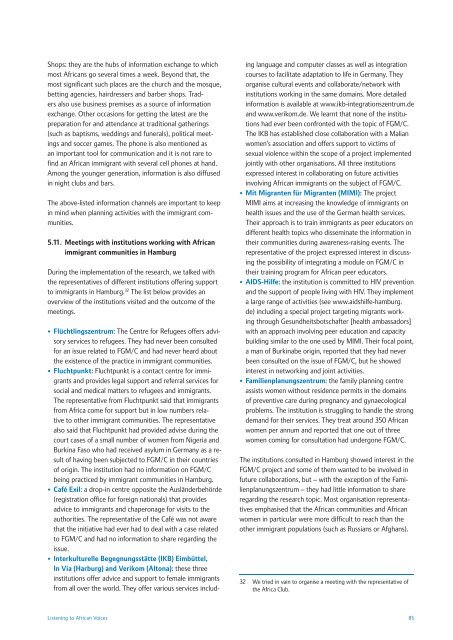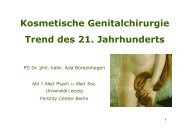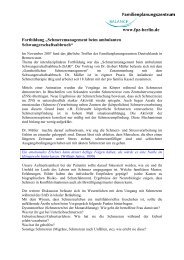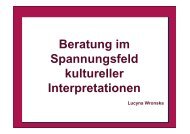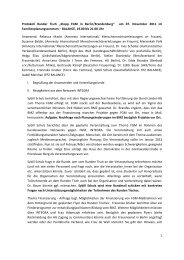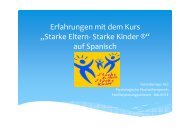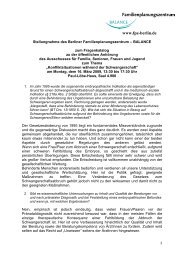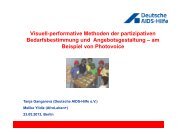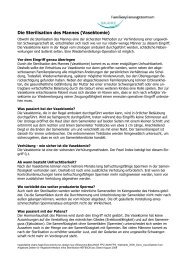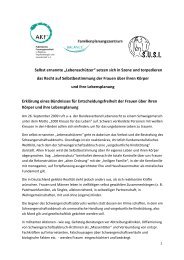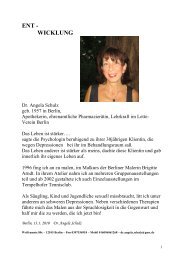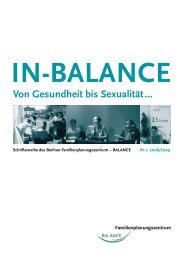Listening to African Voices - FPZ
Listening to African Voices - FPZ
Listening to African Voices - FPZ
Create successful ePaper yourself
Turn your PDF publications into a flip-book with our unique Google optimized e-Paper software.
Shops: they are the hubs of information exchange <strong>to</strong> whichmost <strong>African</strong>s go several times a week. Beyond that, themost signifi cant such places are the church and the mosque,betting agencies, hairdressers and barber shops. Tradersalso use business premises as a source of informationexchange. Other occasions for getting the latest are thepreparation for and attendance at traditional gatherings(such as baptisms, weddings and funerals), political meetingsand soccer games. The phone is also mentioned asan important <strong>to</strong>ol for communication and it is not rare <strong>to</strong>fi nd an <strong>African</strong> immigrant with several cell phones at hand.Among the younger generation, information is also diffusedin night clubs and bars.The above-listed information channels are important <strong>to</strong> keepin mind when planning activities with the immigrant communities.5.11. Meetings with institutions working with <strong>African</strong>immigrant communities in HamburgDuring the implementation of the research, we talked withthe representatives of different institutions offering support<strong>to</strong> immigrants in Hamburg. 32 The list below provides anoverview of the institutions visited and the outcome of themeetings.• Flüchtlingszentrum: The Centre for Refugees offers advisoryservices <strong>to</strong> refugees. They had never been consultedfor an issue related <strong>to</strong> FGM/C and had never heard aboutthe existence of the practice in immigrant communities.• Fluchtpunkt: Fluchtpunkt is a contact centre for immigrantsand provides legal support and referral services forsocial and medical matters <strong>to</strong> refugees and immigrants.The representative from Fluchtpunkt said that immigrantsfrom Africa come for support but in low numbers relative<strong>to</strong> other immigrant communities. The representativealso said that Fluchtpunkt had provided advise during thecourt cases of a small number of women from Nigeria andBurkina Faso who had received asylum in Germany as a resul<strong>to</strong>f having been subjected <strong>to</strong> FGM/C in their countriesof origin. The institution had no information on FGM/Cbeing practiced by immigrant communities in Hamburg.• Café Exil: a drop-in centre opposite the Ausländerbehörde(registration office for foreign nationals) that providesadvice <strong>to</strong> immigrants and chaperonage for visits <strong>to</strong> theauthorities. The representative of the Café was not awarethat the initiative had ever had <strong>to</strong> deal with a case related<strong>to</strong> FGM/C and had no information <strong>to</strong> share regarding theissue.• Interkulturelle Begegnungsstätte (IKB) Eimbüttel,In Via (Harburg) and Verikom (Al<strong>to</strong>na): these threeinstitutions offer advice and support <strong>to</strong> female immigrantsfrom all over the world. They offer various services includinglanguage and computer classes as well as integrationcourses <strong>to</strong> facilitate adaptation <strong>to</strong> life in Germany. Theyorganise cultural events and collaborate/network withinstitutions working in the same domains. More detailedinformation is available at www.ikb-integrationszentrum.deand www.verikom.de. We learnt that none of the institutionshad ever been confronted with the <strong>to</strong>pic of FGM/C.The IKB has established close collaboration with a Malianwomen’s association and offers support <strong>to</strong> victims ofsexual violence within the scope of a project implementedjointly with other organisations. All three institutionsexpressed interest in collaborating on future activitiesinvolving <strong>African</strong> immigrants on the subject of FGM/C.• Mit Migranten für Migranten (MIMI): The projectMIMI aims at increasing the knowledge of immigrants onhealth issues and the use of the German health services.Their approach is <strong>to</strong> train immigrants as peer educa<strong>to</strong>rs ondifferent health <strong>to</strong>pics who disseminate the information intheir communities during awareness-raising events. Therepresentative of the project expressed interest in discussingthe possibility of integrating a module on FGM/C intheir training program for <strong>African</strong> peer educa<strong>to</strong>rs.• AIDS-Hilfe: the institution is committed <strong>to</strong> HIV preventionand the support of people living with HIV. They implementa large range of activities (see www.aidshilfe-hamburg.de) including a special project targeting migrants workingthrough Gesundheitsbotschafter [health ambassadors]with an approach involving peer education and capacitybuilding similar <strong>to</strong> the one used by MIMI. Their focal point,a man of Burkinabe origin, reported that they had neverbeen consulted on the issue of FGM/C, but he showedinterest in networking and joint activities.• Familienplanungszentrum: the family planning centreassists women without residence permits in the domainsof preventive care during pregnancy and gynaecologicalproblems. The institution is struggling <strong>to</strong> handle the strongdemand for their services. They treat around 350 <strong>African</strong>women per annum and reported that one out of threewomen coming for consultation had undergone FGM/C.The institutions consulted in Hamburg showed interest in theFGM/C project and some of them wanted <strong>to</strong> be involved infuture collaborations, but – with the exception of the Familienplanungszentrum– they had little information <strong>to</strong> shareregarding the research <strong>to</strong>pic. Most organisation representativesemphasised that the <strong>African</strong> communities and <strong>African</strong>women in particular were more difficult <strong>to</strong> reach than theother immigrant populations (such as Russians or Afghans).32 We tried in vain <strong>to</strong> organise a meeting with the representative ofthe Africa Club.<strong>Listening</strong> <strong>to</strong> <strong>African</strong> <strong>Voices</strong> 85


